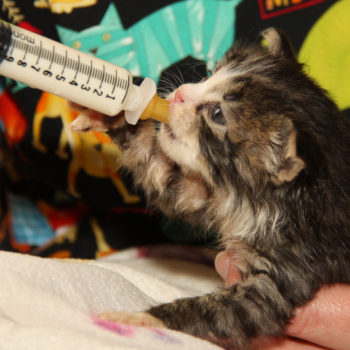If you’re familiar with neonatal kitten litters, you know that suckling is a common issue, and even leads to serious health problems. So why does it happen and how can we prevent it? With the help of Maddie’s® Summer Scholar program, Isabelle Walcher, a student the University of California, Davis, conducted research to find out.
We asked Walcher a few questions about her experience and what she found out after watching hours of kitten video footage.
This interview has been lightly edited and condensed for clarity.
How was your overall experience?
My overall experience with Maddie’s® Summer Scholar was great. I really enjoyed being able to research something I was truly interested about. I think it is a great opportunity to help the lives of shelter animals, while also helping create a great chance for individuals in the animal field to get some great research experience.
How did you decide on your topic?
I worked at the San Diego Humane Society and SPCA (SDHS) as a Seasonal Nursery Caregiver every summer from 2015 – 2017. When I started, I was astonished to learn that orphaned, neonatal kittens have the highest euthanasia rate of all animals that enter the shelter. Also, an important issue that the SDHS Kitten Nursery faced is neonatal kittens suckling on their littermate’s genitalia. This behavior can lead to serious health problems, including the necessity to perform Perineal Urethrostomy and even medical euthanasia, because of the harmful effects of inappropriate suckling on the “victim”. It was a constant struggle for the Nursery staff at SDHS to monitor and manage this behavior. Litters of kittens would have to be separated into different cat condos because of the sucking, which took up space for new incoming orphaned neonatal kittens that needed our help.
What surprised you the most about your research?
I had predicted that the largest kitten within the litter would be the one suckling on the smallest kitten in the litter. However, after we conducted our research, we found that most often it was actually the smallest (based on weight) kitten that was suckling on the other kittens in the litter. Also, eight out of 24 litters (33%) in the study were affected by sucking, and 23% of kittens were affected by suckling. I knew it was a large issue, but I was surprise to see just how common it is in neonatal orphaned kittens.
How will you use your findings?
My hope is to use our findings to now be able to try some methods which may reduce or eliminate neonatal kittens from suckling on their littermates. Now that we have determined it’s a common issue with neonatal kittens and we have found some general patterns, (i.e., no queen present, smallest kitten suckling on the largest, mostly male kittens are the victims, etc.) we can continue to research more in-depth to see if we can find a solution or solutions to help reduce or diminish the behavior.
What did you learn about conducting research?
I learned that there is a lot of patience within research. Part of the research we did was observing video footage of kittens that were suckling on one another. We had motion sensor cameras filming the kittens 24/7, so there was a lot of video to go through, and it took some patience to look through the videos for the suckling behavior.
What topic would you like to explore next?
I’d like to continue studying this same topic because, as stated above, we now have very beneficial information to try to solve the problem of orphaned neonatal kittens suckling genitalia.
What would you tell someone else who is thinking about applying for the Summer Scholar grant?
I would tell them it is a great experience, and you will be able to not only learn a lot yourself, but you also have an opportunity to mentored by some amazing people in the animal world. I am so thankful for the opportunities it has created for me, and the connections I have formed.
Is there anything else you would like to share?
Be passionate and work hard!

